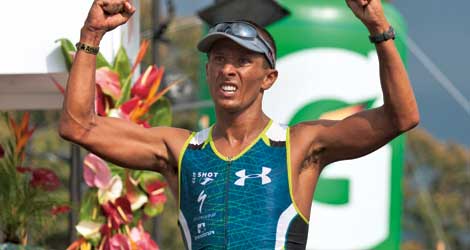Macca tells it like it is
His 2010 Ironman win, Super League, the PTO and more

He is certainly one of the most colourful athletes our sport has ever seen. A two-time Ironman world champion to go along with a couple more world-championship titles, Chris McCormack has converted race success into a successful post-racing business career with endeavours like Super League Triathlon.
Last week McCormack was featured in our “The Life of Tri” podcast.
Related: Counting back to Kona: Macca unplugged
Fans of the sport will be fascinated with McCormack’s frank and honest conversation with Phil Wrochna – it is well worth a listen. Here are a few excerpts from the podcast that peaked our interest:
2010 Ironman win
Ironman race junkies will be fascinated with Macca’s recounting of the dynamics behind is 2010 Kona win over Craig Alexander – starting about 15 minutes into the podcast he runs through the planning and thoughts behind the strategy that catapulted him to the surprise win that year.
Super League
As an events company we got slaughtered this year … but luckily enough for us we raised $20 million last year in our second round of funding. We had seven events planned for 2020 – post Olympics. We launched in 2017, after the Olympics. We knew that a lot of athletes were very Olympics focussed, so we were always targeting post-Tokyo … we locked in the athletes, we locked in our qualification, then COVID happened. From our end we moved the offices to London, we put everyone on furlough – we had hired our entire team to roll out this year so it was very disruptive on that end – so we’ve just treated it as a hibernation year. We’ve spent a lot to keep our team, we’ve focused a lot on different product and we’ll roll out post-Tokyo, if we can. The most difficult thing is the uncertainty, because different governments focus on different things. We have an event in Singapore, the first event after Tokyo … it was going to be a remarkable event … but now the Singapore government is saying no tourism until 2022.
It is a difficult time. We draw confidence or hope out of the vaccine, but I do believe that 2021 will be heavily disrupted. We’re just trying to navigate our way through. We launched the Arena Games this year – a mix of real racing with this online stuff – it was quite successful in Rotterdam, so we have a pivot point, but again, it’s hard to monetize.
It’s trying to stay relevant. Our primary investor and business partner Leonid is a tech guy, so he understands burn rate and so as long as we’re building the community and building that data, or building that following base, he’s happy. He’s still got an appetite to invest. He loves triathlon, but he likes where we’re going. We’ve shown that we can make events profitable. There is an interest in it – we’re hitting our targets for what we’ve planned. We haven’t over-promised and under-delivered, but none of us planned for the pandemic, so that’s been a disruptor to everything.
We’ll definitely have a series at the end of this year – whether it’s the seven races we originally had planned or five – and that will be London, Munich, Jersey, we bought the Malibu triathlon …
Related: Super League acquires the Malibu Triathlon
On the Professional Triathletes Organisation
I enjoyed Daytona … I’ve never quite understood the PTO model … I just ask questions. Sometimes they’ll say to me, why are you so negative. I’m not trying to be negative … to me, it’s Ironman called something else – it’s the half-Ironman distance, they’re just going to put three or four more cameras. I don’t understand how that works for terrestrial television, I don’t understand how that works from the sponsorship space – if Ironman couldn’t pull mega partners, why are you going to be able to do it. Unless you’re changing it up, I don’t quite comprehend …
You’ve raised $12 million from Mike Moritz, it’s a nice chunk of change, but in three events you’re broke. Trust me, I know. Once you start putting television – I know what it costs to put one hour, a two hour show on. You’re talking four hours, you’re talking post production, you’re talking live streaming … there’s an expectation of quality, the amount of cameras, all these things cost. I don’t quite comprehend – without mass participation, what’s the business model.
We’ve (Super League Triathlon) got a billionaire chucking in money, but we’re driven around all KPIs, he’s driving towards profitability. It’s a loss-making machine. Once you go TV, in triathlon, without the big sponsors, you just cannot pay for it. So there’s talk about forgetting terrestrial television, let’s do it all digitally, but you still have to produce a product of value …
(Sponsors) don’t compare you with what Ironman does. They compare you with what golf does, or tennis does.
Attracting the next generation
I feel the sport has gone so long-course-centric – you’re missing a whole generation of young kids. It’s a mid-life crisis sport. Get young kids into it again. Push from the bottom up, not the top down. I think Ironman has indirectly done that because its such a big entity and its so cool, but it’s definitely a sport for 40 and over.
